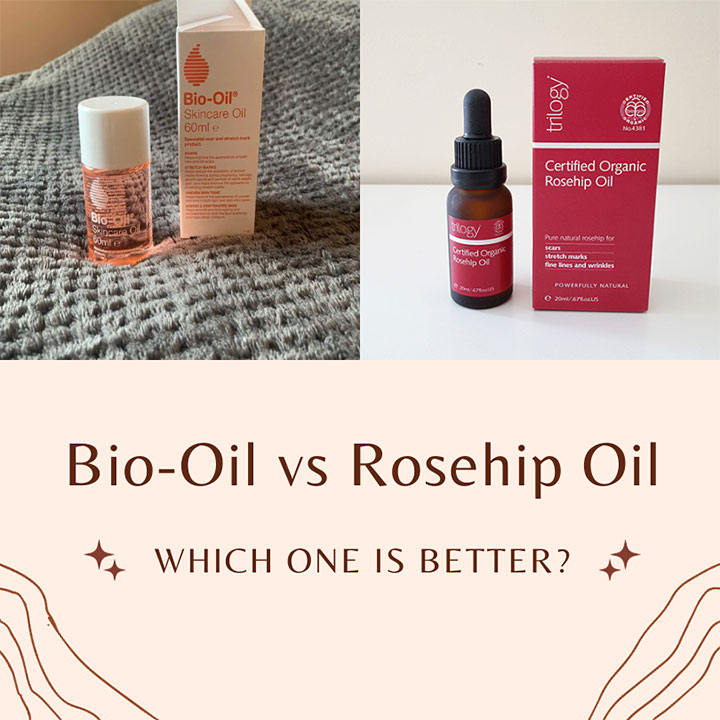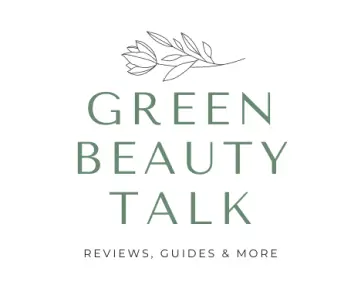
If you are struggling with acne scars, wrinkles and stretch marks you may have heard of Bio-oil and Rosehip oil. Bio-oil is a cosmetic oil and consists of a combination of several vitamins, plant extracts and mineral oils that may improve the appearance of scars.
Rosehip oil, on the other hand, is a rich and nourishing natural oil extracted from the seeds of the dog rose plant known to have amazing skin-improving properties.
So which of these two should you go for? In this article, we will compare both oils and outline which is better for the skin.
Table of Contents
- Is Bio-Oil the same as rosehip oil?
- Bio-oil vs rosehip oil: What’s the difference?
- Bio-oil or rosehip oil: Which one is better for scars?
- Bio-oil vs rosehip oil for stretch marks
- Which is better for wrinkles: Bio-oil or rosehip oil?
- Choosing Between Bio-Oil and Rosehip Oil during pregnancy
- Can you mix Bio-oil with rosehip oil?
- Conclusion: Is rosehip oil or Bio-oil better?
Is Bio-Oil the same as rosehip oil?
Bio-oil and rosehip oil both are popular treatments for improving the appearance of scars, wrinkles and stretch marks on the skin.
Both contain vitamin A and E which help with fading scars, clarifying skin tone and have anti-ageing properties. However, these two products are not the same.
Bio-oil vs rosehip oil: What’s the difference?
The main difference between both oils is that, while rosehip oil is a 100% natural oil, Bio-oil is not. Rosehip oil is derived through a cold-press method and is clear of any additives such as, preservatives, dyes, or fragrances that can cause irritations.
Bio-oil on the other hand is made up of a base of mineral oil and esters into which are added a few plant extracts, vitamins and several other synthetic chemicals like fragrance and dyes.
Here is a breakdown of their ingredients:
Rosehip oil
- Essential fatty acids: Rosehip oil is primarily made up of linoleic, alpha-linolenic, and oleic acids. These fatty acids have a moisturizing effect on the skin and help strengthen the skin’s barrier.
- Antioxidants: Rosehip oil also contains potent antioxidants in the form of phenols that help fight against skin aging and protect the skin from free radicals.
- Vitamin A: This oil has a high concentration of Vitamin A in the form of carotenoids. These compounds have exfoliating properties which help speed up the skin renewal process for brighter and more even skin. The vitamin A present in rosehip oil is scientifically proven to help boost collagen production and slow down the signs of skin ageing.
- Vitamin E: A strong antioxidant, anti-inflammatory and moisturizing compound that helps condition the skin.
Bio-oil
In Bio-oil you will find the following ingredients:
- Fragrance ingredients: Alpha-isomethyl ionone, Amyl cinnamyl, Benzyl salicylate, BHT, Linalool, citronellol, coumarin, eugenol, farnesol, geraniol, limonene, hydroxycitronellal.
- Calendula officinalis flower extract: Calendula oil is used as a fragrance ingredient and skin conditioning ingredient. It is also a natural antioxidant and anti-inflammatory that helps soothe skin tissues and facilitates healing.
- Cetearyl ethylhexanoate: this ingredient is an emollient that conditions the skin.
- Soybean oil: Used as skin emollient and occlusive.
- Sunflower oil: Used as skin emollient and occlusive.
- Chamomile oil: Helps soothe irritated and sensitive skin.
- Isopropyl Myristate: is used as an emollient, binder and fragrance ingredient. It is known to cause skin irritations.
- Lavender oil: Has soothing and calming properties.
- Mineral oil: a petroleum derivative, refined and used as occlusive in cosmetic products.
- Rosemary oil: Natural oil with antiseptic and antioxidant properties that help reduce swelling of the skin
- Tocopheryl acetate: this is vitamin E combined with acetic acid. It acts as an antioxidant and skin conditioner.
- Triisononanoin: is a form of glycerin used as emollient, skin conditioning and viscosity agent.
Bio-oil or rosehip oil: Which one is better for scars?
When it comes to fading acne scars, rosehip oil is more effective than Bio-oil.
Rosehip oil contains a higher concentration of vitamin A thus, works better to clear hyperpigmented areas. It is also richer in antioxidants that help protect the skin from premature ageing.
While there is extensive research on the benefits of rosehip oil, claims made about Bio-oil have only been backed by clinical studies initiated by the Bio-oil company.
The most recent research on the benefits of Bio-oil was carried out on 36 female participants and showed a 61% success rate in improving the appearance of scars. This sounds encouraging however, a lot of anecdotal claims from users do not support this evidence. (1,2,3,)
Bio-oil vs rosehip oil for stretch marks
Stretch marks appear on the skin when the body suddenly expands faster than the skin. This causes the skin to tear and form scars as it heals causing the appearance of stretch marks.
Although both oils contain vitamin A derivatives that can help improve stretch marks by boosting collagen production, rosehip oil remains the best option.
Rosehip oil contains naturally occurring carotenoids that get converted into retinol once absorbed into the skin without any risk. This research on a rosehip oil-based cream proved its efficacy in reducing the severity of stretch marks.
Bio-oil on the other hand contains retinyl palmitate, a synthetic alternative of retinyl acetate (a naturally occurring form of vitamin A). This chemical compound presents the risk of speeding up the formation of cancerous skin tumors and lesions when exposed to sunlight. This is particularly risky for pregnant women as Bio-oil is recommended for daily use during pregnancy.
Which is better for wrinkles: Bio-oil or rosehip oil?
Rosehip oil is scientifically proven to improve wrinkles thanks to the many antioxidants present in it. Free radicals such as UV rays, smoking and pollution are the principal external causes of skin ageing.
Rosehip oil contains a lot more antioxidants than Bio-oil as such and offer more protection from oxidative stress. It equally contains a higher concentration and safer form of vitamin A, thus results in firmer skin. Rosehip oil supports the skin’s barrier by keeping it moisturized thanks to the essential fatty acids present in it.
Bio-oil, on the other hand, mostly contains occlusives such as mineral oil and not that many ingredients that could fight wrinkles.
Choosing Between Bio-Oil and Rosehip Oil during pregnancy
When it comes to selecting a skin care oil during pregnancy, understanding the types of Vitamin A in these products is crucial. Vitamin A is essential but can be problematic during pregnancy, especially in certain forms.
There are two main types of Vitamin A: preformed Vitamin A (retinol) and provitamin A (beta-carotene and carotenoids). For pregnant women, provitamin A is the safer choice. It’s derived from plant sources and is less potent than retinol, reducing any potential risks to the baby.
Rosehip oil is an excellent choice for pregnant women. It’s rich in carotenoids, a type of provitamin A, which are safe and beneficial during pregnancy. These compounds provide the skin benefits of Vitamin A without the associated risks of preformed Vitamin A.
On the other hand, Bio-Oil contains retinyl palmitate, a form of preformed Vitamin A. Retinyl palmitate is created by combining retinol with palmitic acid. While beneficial for skin care in general, an excess of this form of Vitamin A can be harmful during pregnancy, potentially affecting the baby’s development.
In conclusion, for pregnant women concerned about Vitamin A intake through skin products, rosehip oil is the safer and recommended choice over Bio-Oil.
Related content:
Guidelines on how to use rosehip oil safely in pregnancy
Can you mix Bio-oil with rosehip oil?
There exist no contraindications against combining bio-oil with rosehip oil as both are classified safe for use on the skin.
Conclusion: Is rosehip oil or Bio-oil better?
From the previous points raised, it is clear that rosehip oil is a better option for fading scars, wrinkles and stretch marks. While Bio-oil is equally a popular option, some of the ingredients present in this product present the risk of causing skin irritations as opposed to its natural counterpart.
There is not enough scientific data to back the claims of Bio-oil aside from clinical studies initiated by the brand and reviews from users seem to conflict with the brand’s claims. Rosehip oil is safer and more effective as it tackles scarring, ageing and stretch marks from a multidimensional perspective. It is also a more affordable treatment option as compared to Bio-oil.
Related content:
Is rosehip oil safe while breastfeeding?
Guidelines on how to use rosehip oil safely in pregnancy

Petra Nakashian (previously Kravos) is a dedicated natural health and beauty blogger, driven by the loss of her parents to cancer, which led her to meticulously research beauty product ingredients. With over 10 years of experience, her in-depth knowledge has made her a trusted expert in the field. Founder of Be Healthy Now and Green Beauty Talk, Petra recently expanded her expertise with Beauty Insights Hub, exploring a wider range of beauty treatments. Committed to transparency and honesty, her work is a vital resource for navigating the complex world of beauty.

